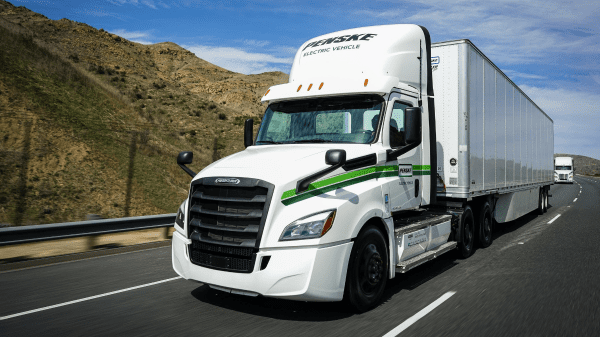A Penske electric truck.
On March 31, the Biden administration allowed California to have the legal authority to require half of all heavy trucks sold in the state to be electric by 2035.
The rule would apply to garbage trucks, tractor trailers, cement mixers and other heavy commercial vehicles, and it comes soon after California passed regulations that require all passenger vehicles sold there to be electric by the same timeline.
It’s all part of an effort by California to reduce carbon dioxide emissions.
According to The New York Times, the legal waiver from the Environmental Protection Agency allows California to step ahead of new federal standards on climate warming truck pollution, which the Biden administration plans to release later this year. In December, the EPA announced a federal rule to cut nitrogen oxide from heavy vehicles, the first time in two decades that it has tightened tailpipe emissions from trucks.
“This is a moment to mark because it’s a preview of the order of magnitude of the change in the industry,” Gavin Newsom, the Democratic governor of California, said in an interview with The Times. “There’s a power in these waivers and that power is emulation. We adopt through these waivers the principles and policies that lead to innovation and investment.”
Right now, less than 2 percent of all heavy trucks sold in the U.S. are electric, so the new rule will put stress on the transportation industry if it remains in place.
“A lot of the California truck rules that have been adopted and enacted recently are starting to push truck drivers out of the state,” said Jay Grimes, director of federal affairs for the Owner-Operator Independent Drivers Association, which represents truckers, in The Times story. “Drivers don’t want to work in California anymore. They’re skeptical of the rapid timeline on this transition to electric trucks. Can a trucker get a charge that will take them on a highway for two or three days? Is the technology ready for prime time?”
The Times reports that a legal fight is already underway against the rule.
“Republican attorneys general from 17 states are challenging California’s ability to enact state pollution standards that are tougher than federal standards,” the Times writes. “That case, Ohio vs. EPA, is set to be heard in the United States Court of Appeals for the District of Columbia Circuit in May. Regardless of the decision in that case, it is expected to be appealed to the Supreme Court.”
On March 31, the Biden administration allowed California to have the legal authority to require half of all heavy trucks sold in the state to be electric by 2035.
The rule would apply to garbage trucks, tractor trailers, cement mixers and other heavy commercial vehicles, and it comes soon after California passed regulations that require all passenger vehicles sold there to be electric by the same timeline.
It’s all part of an effort by California to reduce carbon dioxide emissions.
According to The New York Times, the legal waiver from the Environmental Protection Agency allows California to step ahead of new federal standards on climate warming truck pollution, which the Biden administration plans to release later this year. In December, the EPA announced a federal rule to cut nitrogen oxide from heavy vehicles, the first time in two decades that it has tightened tailpipe emissions from trucks.
“This is a moment to mark because it’s a preview of the order of magnitude of the change in the industry,” Gavin Newsom, the Democratic governor of California, said in an interview with The Times. “There’s a power in these waivers and that power is emulation. We adopt through these waivers the principles and policies that lead to innovation and investment.”
Right now, less than 2 percent of all heavy trucks sold in the U.S. are electric, so the new rule will put stress on the transportation industry if it remains in place.
“A lot of the California truck rules that have been adopted and enacted recently are starting to push truck drivers out of the state,” said Jay Grimes, director of federal affairs for the Owner-Operator Independent Drivers Association, which represents truckers, in The Times story. “Drivers don’t want to work in California anymore. They’re skeptical of the rapid timeline on this transition to electric trucks. Can a trucker get a charge that will take them on a highway for two or three days? Is the technology ready for prime time?”
The Times reports that a legal fight is already underway against the rule.
“Republican attorneys general from 17 states are challenging California’s ability to enact state pollution standards that are tougher than federal standards,” the Times writes. “That case, Ohio vs. EPA, is set to be heard in the United States Court of Appeals for the District of Columbia Circuit in May. Regardless of the decision in that case, it is expected to be appealed to the Supreme Court.”



